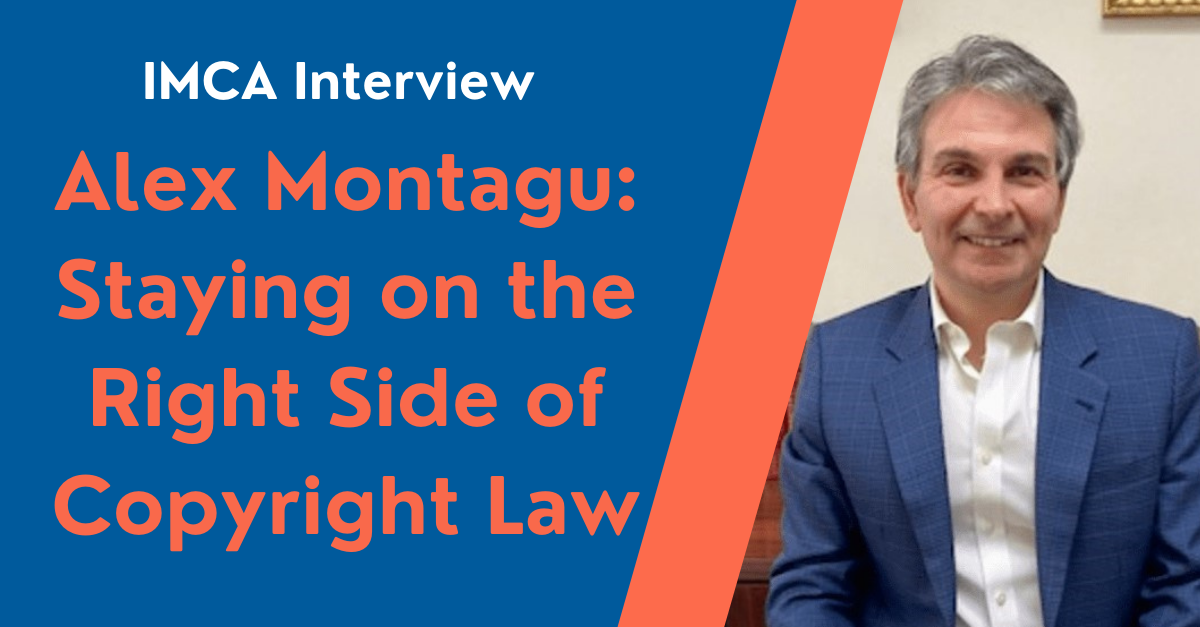COPYRIGHT LAWS ARE FUZZY, BUT INADVERTENT VIOLATIONS CAN LAND YOU IN HOT WATER. ATTORNEY ALEX MONTAGU HAS TIPS.
By Amy Hourigan, director of marketing at HAI Group and IMCA board member
Amy Hourigan: Thanks for agreeing to share your expertise with us, Alex. Let’s get to it. Copyright law is a gray area for many marketers. We know we need a license to use copyrighted images, but what about written information? For example, is it okay to link to another public-facing article or blog post if the resource is available on the internet?
Alex Montagu: As a general rule, you need written permission to use someone else’s written work. There are some exceptions; for example, quoting someone else’s work in a news article. However, using someone else’s written work commercially requires a license. Linking to someone else’s public-facing site is acceptable in the U.S. but the EU has stricter laws concerning linking. Proceed with a great deal of caution.
AH: Good to know. Say you’re creating a published guide for your customers and you want to use information from another source. Can you simply cite all references at the end with footnotes to protect yourself from copyright infringement claims? Or do you need permission to use the material?
AM: Facts and figures are not copyrightable. However, a particular presentation of facts and figures (as in a table, chart, or analysis) can be copyrightable. Therefore, while you can freely use facts and figures from another source, be very careful about using other people’s charts, tables, guides, or analyses.
AH: What do marketers need to do to protect their organizations when introducing a new company or product?
AM: The most important step in introducing a new company or product is a trademark clearance search to ensure that the name of the company or product is available for use. Many people make the mistake of assuming that a name they choose or even made up hasn’t been used before. But if the trademark search is clear, then you should apply to register the name of the company or product as a trademark in all the countries where you plan to do business. Note that a trademark registration in the U.S. will not provide protection outside the U.S. You should also register any corresponding URLs that you plan to use. It is highly recommended that you consult an intellectual property (IP) lawyer before adopting and using a new company or product name.
AH: Great tip. What should one look for in a legal team, and what are the types of activities that should be included in an intellectual property strategy?
AM: Many factors inform a company’s intellectual property strategy. For example, ensuring that your company name and product names are properly registered and protected, ensuring that you own all the intellectual property created for you by third parties, ensuring that you don’t infringe on other people’s intellectual property (which could lead to financially ruinous lawsuits)… these are all vital aspects in how to approach your IP strategy. In general, you should take advice from and consult with a law firm that has the requisite experience in this area. These firms, like Montagu Law, are sometimes referred to as intellectual property boutiques, suggesting that they are smaller firms that focus their practice on intellectual property law and have the requisite expertise in the field that even larger law firms do not.
AH: What type of protections should you have in place if you, say, hire an agency to monitor/optimize your website, or hire an agency to create marketing videos or other work?
AM: When you retain the services of any third party such as an agency to monitor your website or create videos, you should have a written agreement that ensures that your company owns all the intellectual property rights created by the agency. This is another common mistake where you may be opening yourself to a problem if in their work for you in managing those site/s and content [it] makes them the holder of those IP rights.
AH: How can marketers protect our own work? Are copyrights implied? What do we do if we find that someone used our material without permission?
AM: Copyright protection vests immediately upon the creation of a work. Therefore, while copyright protection extends to creative works without the need for a registration, copyright registration provides some useful additional protections, such as statutory damages and lawyers’ fees that make it worthwhile to register your copyrights. If you find out that someone else has been using your material without permission, consult with an intellectual property lawyer to see if you have a case.
AH: What’s the biggest mistake you see financial services marketers make with regard to intellectual property?
AM: The biggest mistakes I see are adopting and using company and product names without proper clearance searches and retaining the services of third parties without the proper agreements in place.
AH: Glad we covered those! How can marketers stay up to date on copyright compliance laws?
AM: The Copyright Office has a website with a lot of useful information. But this is an area that you would be best served by getting advice from an intellectual property lawyer early on rather than relying on a do-it-yourself approach since there is some legal language of which you may not be familiar.
AH: Thanks, Alex.
AM: My pleasure.


